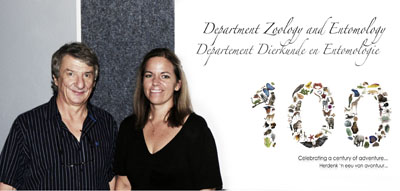 |
|
Dr Candice Jansen van Rensburg and Prof. Jo van As.
|
The Department of Zoology and Entomology is celebrating its hundredth birthday. To commemorate this, a series of lectures will be presented throughout the year. The lectures focus on the history of the department, as well as past and current research activities.
At the first lecture, Prof. Jo van As, Head of the Department, presented a comprehensive history of the academic background of the department, including information on all the preceding heads of Zoology and Entomology. He also gave an overview of the history of the Aquatic Ecology research group that he started in 1988 when he first became the Head of the Department.
In her lecture, Dr Candice Jansen van Rensburg outlined the activities of the newly established Nematology study group. She stressed the importance of establishing this field of expertise in an effort to address the lack of trained nematologists in South Africa.
Future lectures will be presented by the department’s various study groups and will be held on a quarterly basis. The lectures are held in the Biology 1 lecture hall (BL1) and are open to all. The celebrations will culminate in a centenary banquet later in the year. – Prof. Linda Basson.
The dates for future lectures are as follows:
10 May: Arachnology and Acarology
2 August: Eco-Ethology and Environmental Entomology
15 November: Herpetology and Insect-Plant Interactions